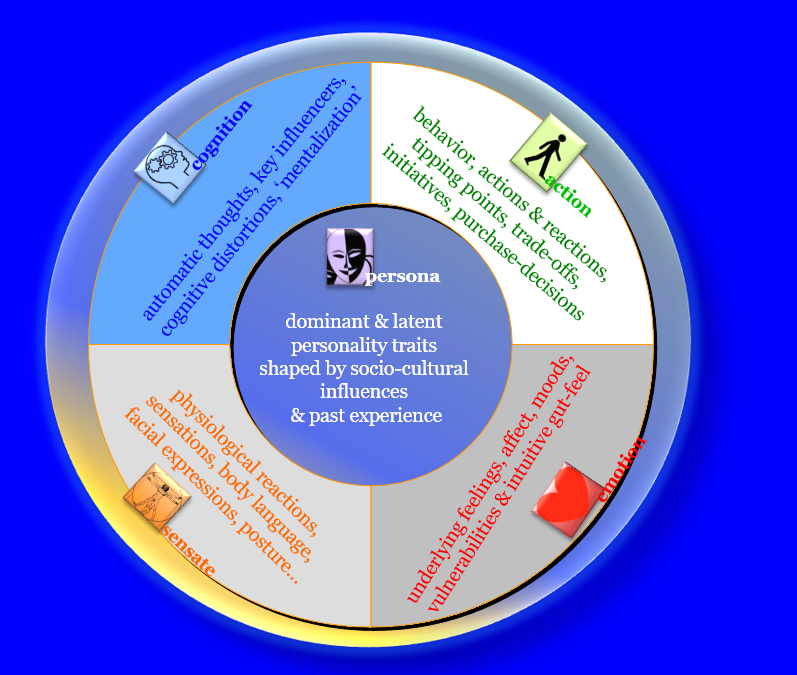Public Content
Qualitative Research
Dufferin Research now offers Qualitative Research with our strategic partner Batool Batalvi.
Batool is both an experienced qualitative researcher, and a registered pyschotherapist. She uses a psychodynamic framework that integrates psychotherapeutic approaches, to contextualize human experience with the objective being to help conceptualize & appreciate the multi-dimensionality of consumer schema which can be distilled into a rich, strategic template.
In using a psychodynamic approach the guiding principle is that there is a ‘dynamic’ relationship between the conscious and unconscious motivations that underlie human behavior, cognition, personality and emotions.
Philosophy -the unconscious is linguistically structured. ‘Language’ is our tool for thinking, experiencing & communicating.
Belief -there are many possible truths. We continually strive for meaning, and tell ourselves stories in a virtually uninterrupted monologue, to re-construct our ‘self’.
Approach-empathic conversations. We scaffold conversations for dominant & subordinate storylines that create movement in the landscape of ‘identity’ & ‘action’ for collaborative knowing.
Method – pivotal moments of transformation. Learning occurs via ‘dialogic mutuality’ by externalizing conversations, separating from the ‘known & familiar’ moving towards the ‘possible to know’.
Technique-the absent but implicit. We unpack problems & develop ‘thicker’ storylines, that render alternate solutions to a person’s values, hopes & life’s commitments.
Self-agency -re-authoring stories. When people engage in a different ‘telling’ & ‘listening’ …new meanings, ideas and possibilities present themselves, along with a willingness to change.
She applies a 5KEYS™ Diagnostic Tool to unlock the five key dimensions to hidden consumer truths:
1. Cognition -automatic thoughts, mentalization, cognitive distortions, trade offs, key influencers… impacting thought processes
2. Affect -underlying feelings, moods, motivations and intuitive gut-feel
3. Behavior -actions & reactions, in-home & in-store behavior, precipitating factors, tipping points… purchase decision
4. Physiological Response – Sensory reactions, sensates, body language, facial expressions… (real or imagined)
5. Personality -predominant personality & cultural traits, both overt and covert tapped into by the category / brand including cultural archetypes
Please contact Rick Frank for quotations either as part of a Qual/Quant mixed project or qualitative-only.
 Have you ever struggled to "quit" Facebook? Well, Cornell knows why.
Have you ever struggled to "quit" Facebook? Well, Cornell knows why.
If you are finding it difficult to quit or "break up" with Facebook, researchers at Cornell University have found you are not alone.
New research suggests four main reasons why the social media site is so difficult to let go.
The University focused its research on the "99 Days of Freedom" campaign, which was launched back in 2014 to encourage people to log off for 99 days.
The campaign simply required for users to change their profile pic to the "99 Days of Freedom" logo and then abstain from using Facebook for nearly 100 days. It was all based on the honor code.
Since not all those who joined the campaign made it to 99 days, the researchers sent out surveys on the 33rd, 66th and 99th days of the pledge to see why they dropped the ball. The surveys asked people various closes-ended questions with a mix of open-ended, free-text responses.
Read more: Science confirms that quitting Facebook makes people happier
 Long-term stress damages the brain’s short-term memory system, new research finds.
Long-term stress damages the brain’s short-term memory system, new research finds.
Chronic stress leads to a build-up of macrophages in the the brain, researchers found.
It took four weeks for the immune response to reduce and the memory problems to resolve.
The researchers also found that the memory problems resolved themselves in 28 days.
How exactly does stress interfere with memory? To answer this question we first need to understand how memory works.
 There's a reason why your body feels good when you eat healthy foods — and why you feel so tired after eating junk. Our bodies use energy to convert the foods we eat into liquids to be absorbed. When you drink juice, your body is essentially skipping this step and saving energy.
There's a reason why your body feels good when you eat healthy foods — and why you feel so tired after eating junk. Our bodies use energy to convert the foods we eat into liquids to be absorbed. When you drink juice, your body is essentially skipping this step and saving energy.
We all could probably eat more fruits and vegetables. But if forced to choose between whole fruit or a glass of juice, which one seems more healthful?
The general advice is to opt for the fruit, since juices are stripped of the fiber – which most us don't get enough of — in whole fruit. And let's face it: Most juice contains a lot of sugar, which most of us consume too much of.
When it comes to oranges, juice might actually unlock more carotenoids and flavonoids – both beneficial phytonutrients — than an equivalent amount of fruit.
 The Christmas spirit has been a widespread phenomenon for centuries, commonly described as feelings of joy and nostalgia mixed with associations to merriment, gifts, delightful smells, and copious amounts of good food. It is yet to be determined, however, where in the human body this “Christmas spirit” resides and which biological mechanisms are involved.
The Christmas spirit has been a widespread phenomenon for centuries, commonly described as feelings of joy and nostalgia mixed with associations to merriment, gifts, delightful smells, and copious amounts of good food. It is yet to be determined, however, where in the human body this “Christmas spirit” resides and which biological mechanisms are involved.
How music affects the way we shop?
It turns out there’s quite a bit of research indicating that music affects our shopping behavior, even when we’re not aware of it.




